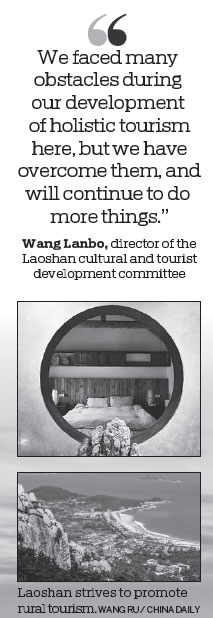Between a mountain and the sea
Laoshan district in Qingdao, Shandong province, is working hard to promote holistic tourism
Blessed with both sea and mountains views, Laoshan district in Qingdao city, East China's Shandong province, is a popular tourist destination. During this year's May Day holiday from May 1 to 4, the district received 208,000 visitors, up 69 percent compared with the same period last year.
Laoshan district is named after Laoshan Mountain, and it is also a coastal district since it is near the Yellow Sea.
The natural beauty is stunning, and it is also known for its Taoist culture, with Taiqing Palace the oldest and largest Taoist temple on Laoshan Mountain.
Qing Dynasty (1644-1911) writer Pu Songling visited Laoshan Mountain in 1672 and wrote a novel called The Taoist of Laoshan Mountain.
A wall which is said to be the prototype of the wall the Taoist passes through in Pu's novel is still visible in Taiqing Palace.
The district, which recently held a tourism promotion event in Qingdao, has been working consistently over the past few years to showcase its efforts to develop holistic tourism in the area.

In 2017, a series of governmental institutions related to tourist development were integrated into a district-level tourist development committee, and it was made the Laoshan's cultural and tourist development committee in 2018.
Such integration can also be seen in the emergency command center of this committee, where people from the local public security bureau, transport bureau and fire department are involved.
"In the past, when one bureau dealt with tourist issues, it usually could not solve the problems since it didn't have enough power. But the integration means many bureaus together can solve the problems with joint efforts and powers, which makes the whole thing much easier," says Wang Lanbo, the director of the Laoshan cultural and tourist development committee.
"For example, if a traveler lodges a complaint about food sanitation, all related bureaus like the price bureau, the market regulation bureau and the health bureau will immediately join in," says Wang.
The emergency command center is also a big data center.
In 2018, Laoshan worked with Chinese internet company Tencent and developed a "smart Laoshan" system.
The system enables those on duty to see all real-time data, including the volume of travelers, travelers' consumption patterns, the number of sightseeing vehicles, online public opinions and other things.
"We are also connected with the public security bureau's monitoring system. In the past it was unthinkable, but our integration of many tourist-related bureaus makes it possible. This is indeed an institutional innovation," says Wang.
Also, Laoshan has had a tourist hotline 96616 since 2013 to deal with travelers' complaints, and help them when they are in need.
Now, the line receives about 60,000 to 80,000 phone calls a year, and sometimes over 1,000 a day.
"After training, our operators are familiar with the procedures, and they are very clear about whom they should contact and what resources they should dispatch when they receive calls," says Wang.
The operators are on duty 24 hours. And they are required to hand in their mobile phones when they are at work so that they are not distracted.
Speaking about the call center, operator Xin Wenshan says: "We have a meeting to review cases every month, during which we analyze cases and learn from them, so that all the operators can improve and help travelers solve problems."
Laoshan is also striving to promote rural tourism, a typical example of which is the development of homestays.
Speaking about the project, Zhao Yan, the chief of Laoshan district, says: "The development of homestays epitomizes Laoshan's effort to promote holistic tourism."
The "Xianju Laoshan" homestays, which mean "living in Laoshan like fairies" in Dongmaiyao village are a highlight of the project.
According to Li Shaoliang, the head of the Dongmaiyao village, the homestays are a good way to make productive use of vacant houses in the village.
"We rent vacant houses from villagers and give them 30,000 yuan ($4,365) every year. And we also invite a team from the Central Academy of Fine Arts to redesign the place," says Li.
The homestays are especially suitable for families. There, travelers can enjoy a peaceful life amid the mountain and the sea. And cherry trees can be seen on the roadside.
"Also, we have formed an alliance with two other villages, Ximaiyao and Liuqinghe, to promote rural development. Now homestays and restaurants are the main industries here, but in the future we will promote more activities like camping, educational excursions, beach entertainment and intangible cultural heritage," says Li.
For now, there are 71 homestays in three villages, but Li promises to continue improving services for travelers.
"We faced many obstacles during our development of holistic tourism here, but we have overcome them, and will continue to do more things," says Wang.
wangru1@chinadaily.com.cn
|
Laoshan district in Qingdao, Shandong is blessed with sea and mountain views. Photos provided to China Daily |

(China Daily Global?07/01/2019 page15)


 Shandong Culture and Tourism Consumption Season
Shandong Culture and Tourism Consumption Season Culture, tourism sectors pick up in Shandong as epidemic wanes
Culture, tourism sectors pick up in Shandong as epidemic wanes

